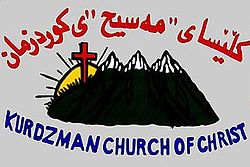- Kurdish Christians
-
Kurdish Christians (Kurdish: Kurdên Xirîstî[1]) are Kurds who follow Christianity and mostly live in the Kurdistan region. The word Xirîstî is derived from the Greek words χριστιανός (khristianos) and χριστιανή (khristiani). The Arabic word Mesîhî is also sometimes used. Kurdish Christians should not be confused with other historical Christian communities living in the area such as the Assyrians, Armenians or Georgians. The total number of Kurdish Christians today is uncertain but is probably in the tens of thousands, most of them living in Turkey.
Contents
History
According to a legend, Mar Saba succeeded in converting some sun-worshipping Kurds to Christianity in the fifth century[2][3].
Most Kurds converted to Islam after the Arab conquest of the Sassanid Empire. However, there were Kurdish converts to Christianity even after the spread of Islam. In the ninth century, a Kurd named Nasr or Narseh converted to Christianity, and changed his name to Theophobos during the reign of Emperor Theophilus and was the emperor's intimate friend and commander for many years.[4] During the same period, the Kurdish prince Ibn-ad-Dahhak, who possessed the fortress of al-Jafary, abandoned Islam for Orthodox Christianity.[5]
There were many Kurdish Christian communities and tribes reported by medieval writers as late as the 10th[6] and 13th centuries AD. In the late 11th and the early 12th century AD, Kurdish Christian soldiers comprised 2.7% of the army of fortress city of Shayzar in present-day Syria.[7].
In the 19th century, several Christian villages existed in Kurdistan, whose inhabitants spoke only Kurdish, and there were Muslim Kurdish tribes that recalled they were once Christians. Kurds who converted to Christianity usually turned to the Nestorian Church.[8]. In 1884, researchers of the Royal Geographical Society reported about a Kurdish tribe in Sivas which retained certain Christian observances and sometimes identified as Christian.[9] It is also possible that many Kurdish Christians have been linguistically and hence ethnically absorbed by Semitic-speaking Christians of Mesopotamia, especially after Islamic expansions in Middle East.[10]
In the early 20th century, a Lutheran mission from United States and Germany began to serve the Kurds of Iran. From 1911 to 1916, it established a Kurdish congregation and an orphanage.[11] One of the most prominent Kurdish leaders in Iraqi Kurdistan, Sheikh Ahmed Barzani who was a brother of Mustafa Barzani, announced his conversion to Christianity during his uprising against the Iraqi government in 1931[12].
Contemporary Kurdish Christians
In recent years many Kurds from Muslim background have converted to Christianity.[13][dead link] After the Gulf War in 1991, Christian agencies offered help to Kurdish refugees, who were amazed that the assistance came from Christians.[14]
The Kurdish-Speaking Church of Christ (The Kurdzman Church of Christ) was established in Hewlêr (Arbil) by the end of 2000, and has branches in the Silêmanî, Duhok governorates. This is the first evangelical Kurdish church in Iraq.[15] Its logo is formed of a yellow sun and a cross rising up behind a mountain range. Kurdzman Church of Christ held its first three-day conference in Ainkawa north of Arbil in 2005 with the participation of 300 new Kurdish converts.[16]
In Turkey, Christianity has attracted a number of converts both among Kurds and Turks in the past decade. In Iraqi Kurdistan, several evangelical groups have been formed. While in some cases they have faced intolerance by extremist Muslims, their activities are largely tolerated by the Regional Government of Kurdistan (KRG) out of a desire to remain democratic. Since 2001, Servant Group International has established three English-language Christian schools titled Classical School of the Medes in Iraqi Kurdistan. By 2005 three campuses in Sulaimaniya, Irbil and Dohuk with a total enrolment of 700 students, were operational.[17] Kurdistan Regional Government has recently awarded legal status and an official permit to the Bible Society to open a branch in the region.[18] Kurdish converts to Christianity began to discuss petitioning KRG for the right to change the religious status on their ID cards in 2007.[19]
One of the best known Kurdish Christians is Daniel Ali, who converted to Christianity in 1995 and has written two books in English on rejecting Islam. He entered the Catholic Church in 1998.[20] Another known Kurdish Christian is Majeed Rashid Mohammed. He established a network for former Kurdish Muslims with about 2,000 members today.[21]
See also
References
- ^ Massehi in Kurdish Wiktionary
- ^ Bedjan, Acta Martyrum et Sanctorum, vol. ii, pp. 672-3
- ^ G. R. Driver, The Religion of the Kurds, Bulletin of the School of Oriental Studies, University of London, 1922, p.208
- ^ I. Sevcenko, Review of New Cambridge History of the Byzantine Empire, Slavic Review, p.111, 1968.
- ^ A. Vasilyev, Vizantija i araby. Vol. II. (Saint-Petersburg, 1902), p. 220.
- ^ http://www.itnet.org/kurds_church.html
- ^ David Nicolle, Christa Hook, Saracen Faris, 1050-1250 AD, 64 pp., Osprey Publishing, 1994, ISBN 1855324539, see p.7, Table A.
- ^ John Joseph, The Modern Assyrians of the Middle East: Encounters with Western Christian Missions, Archaeologists, & Colonial Powers, Brill Academic Publishers, 292 pp., 2000, ISBN 9004116419, p.61
- ^ Proceedings of the Royal Geographical Society, 1884, p.313
- ^ M.R. Izady, The Kurds: A Concise Handbook, Taylor & Francis, 1992, ISBN 0844817279, pp.163,164.
- ^ John Joseph, Warren D. Gribbons, Muslim-Christian Relations and Inter-Christian Rivalries in the Middle East, SUNY Press, 1983, ISBN 0873956001, p.179
- ^ The Kurdish Minority Problem, p.11, Dec. 1948, ORE 71-48, CIA [1].
- ^ urbana.org - Articles
- ^ God Will Start With You, Rev. David Holwick, First Baptist Church, New Jersey, Sep. 1997
- ^ Revival Times
- ^ UNAMI: Iraqi Media Monitoring
- ^ Classical School of the Medes - Index
- ^ Future Bright for Bible Society in Iraq as Legal Status is Granted
- ^ Tuck's Professional Services
- ^ [2]
- ^ Norge IDAG - Norwegian language newspaper - Friday May 7 2010
External links
Categories:- Asian Christians
- Christianity in Kurdistan
- Kurdish people
Wikimedia Foundation. 2010.

